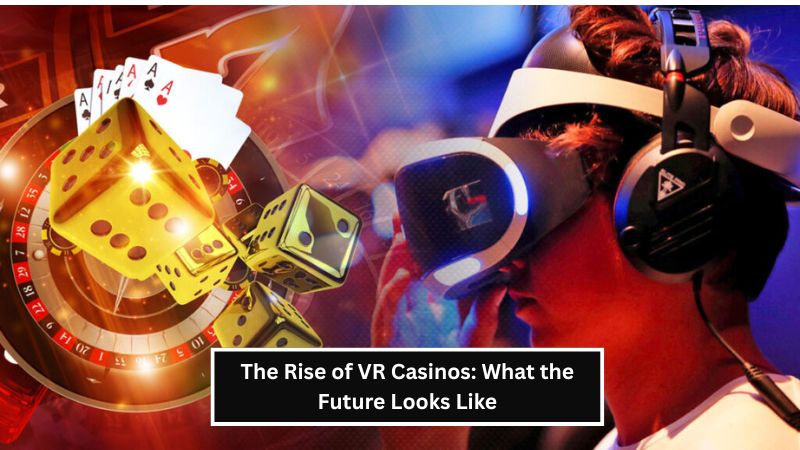As technology continues to evolve, so does the gambling industry. One of the most exciting innovations in recent years is the development of Virtual Reality (VR) casinos. These immersive, high-tech platforms are reshaping the way people experience gambling, offering players the chance to enter fully interactive virtual worlds where they can gamble, socialize, and explore in ways never before possible. But what does the future of VR casinos look like? In this blog post, we will explore the rise of VR casinos, their potential impact on the gambling industry, and the future possibilities they present.
What Are VR Casinos?
Virtual Reality casinos are digital gambling platforms that use VR technology to create an immersive environment for players. Instead of simply placing bets and playing games on a flat screen, VR casinos allow players to experience a fully three-dimensional world where they can interact with their surroundings in a lifelike way. Through the use of VR headsets and other equipment like motion controllers, players can “step into” virtual casinos and engage with games such as slots, poker, roulette, and more. VR casinos are designed to replicate the experience of being in a real-world casino, with all the atmosphere, sounds, and social interactions that come with it.
The Technology Behind VR Casinos
The technology powering VR casinos is the same that has been driving VR gaming and other immersive digital experiences in recent years. Virtual Reality headsets, such as the Oculus Rift, HTC Vive, and PlayStation VR, are essential for users to experience the virtual world. These headsets track the movement of the user’s head and provide stereoscopic images, creating a sensation of presence within the digital environment. Additionally, haptic feedback controllers allow players to interact with virtual objects and place bets, enhancing the realism of the experience.
In addition to VR headsets, other technologies such as 360-degree video, real-time rendering, and AI (artificial intelligence) are used to create lifelike environments and ensure that the games run smoothly. VR casinos often incorporate detailed graphics, realistic physics, and live dealers, creating an environment where players feel as though they are physically present in a casino, even if they are sitting at home.
How VR Casinos Are Different from Traditional Online Casinos
Traditional online casinos have been around for years, offering players the ability to gamble from the comfort of their own homes. These platforms are typically accessed through a computer or mobile device, where players interact with a user interface and place bets on virtual versions of popular casino games.
The key difference between VR casinos and traditional online casinos lies in the level of immersion. While traditional online casinos rely on screens to display the games and interfaces, VR casinos transport players into a fully three-dimensional world. Players can look around, interact with virtual objects, and even chat with other players or live dealers in a way that feels more natural and social than traditional online gambling.
Additionally, VR casinos offer a higher level of personalization. Players can customize their avatars, choose their preferred gambling environment, and engage in social interactions that mirror real-world casino experiences. For example, in a VR poker game, players can hold cards, stack chips, and even bluff or gesture at their opponents in a much more realistic manner than simply clicking buttons on a screen.
Why VR Casinos Are Gaining Popularity
There are several factors contributing to the rise of VR casinos. One of the main reasons for their growing popularity is the desire for more immersive and engaging gaming experiences. As VR technology has advanced, the experiences it offers have become increasingly lifelike, drawing in players who want to experience gambling in a more realistic way.
Another factor is the convenience and accessibility that VR casinos provide. With the ability to access virtual casinos from home, players no longer need to travel to physical gambling destinations to enjoy a high-quality experience. VR casinos allow players to enjoy the atmosphere of a land-based casino without the need to leave their living rooms.
Additionally, the social aspect of VR casinos has made them attractive to players who enjoy interacting with others while they gamble. Unlike traditional online casinos, where players often play alone or chat with strangers through text, VR casinos offer a more personal and social experience. Players can communicate with friends or other gamblers through voice chat, and they can interact with live dealers in real time. This sense of community has helped VR casinos attract a dedicated following.
The Impact of VR Casinos on the Gambling Industry
VR casinos have the potential to significantly impact the gambling industry in several ways. One of the most notable changes is the way in which VR technology could help land-based casinos compete with the rise of online gambling. As more people turn to online casinos for convenience, land-based casinos have faced challenges in maintaining their customer base. VR casinos offer a way for traditional casinos to adapt to the digital age and provide an experience that rivals the thrill of a physical casino.
In addition to attracting new players, VR casinos can also offer more innovative and creative games that are difficult or impossible to implement in a traditional setting. For example, VR casinos could introduce completely new game mechanics or formats that take advantage of the immersive nature of VR. These unique experiences could help casinos stand out in a crowded market and attract a broader audience.
Furthermore, VR casinos could also pave the way for more responsible gambling practices. Since VR platforms allow for better tracking of user behavior, casinos could use this data to implement features that promote responsible gambling. For example, VR casinos could offer reminders to players about their time and spending limits, or offer tools to help players manage their gambling habits more effectively.
Challenges Facing VR Casinos
While VR casinos have the potential to revolutionize the gambling industry, there are still several challenges that need to be addressed before they can become mainstream. One of the primary hurdles is the cost of VR equipment. While VR headsets have become more affordable in recent years, they are still not within the budget of everyone. Additionally, the quality of the VR experience depends heavily on the hardware being used, meaning that players who invest in cheaper headsets may not enjoy the same level of immersion as those with high-end devices.
Another challenge is the need for better internet infrastructure. VR gaming requires a stable and fast internet connection to ensure smooth gameplay, and many players in rural or less developed areas may not have access to the necessary bandwidth. This could limit the reach of VR casinos to certain demographics and regions.
Finally, the user experience can still be improved. Although VR casinos offer a level of immersion that traditional online casinos cannot match, the technology is still evolving, and there may be issues with motion sickness, glitches, or other technical problems that can disrupt the gaming experience. As VR technology continues to improve, these issues are likely to be addressed, but for now, some players may find VR casinos difficult to enjoy.
The Future of VR Casinos
The future of VR casinos looks incredibly promising, with advancements in technology continuing to push the boundaries of what’s possible. As VR equipment becomes more affordable and internet speeds increase, we can expect to see an even larger shift toward virtual gambling experiences.
In the near future, VR casinos may become more integrated with other technologies, such as augmented reality (AR) and artificial intelligence (AI). Augmented reality could add an extra layer of immersion by blending virtual elements with the real world, while AI could enhance the realism of virtual dealers and opponents.
Moreover, blockchain technology may play a role in the future of VR casinos. Blockchain could enable secure and transparent transactions, allowing players to gamble with cryptocurrencies in a decentralized and secure environment. This would provide added security and privacy for players, while also offering new payment methods and rewards systems.
As VR casinos continue to evolve, we may see more interactive and social features, such as live events, concerts, and even virtual tours of famous casinos around the world. With the integration of AI, VR casinos could provide personalized gaming experiences that adapt to the player’s preferences and behavior, further enhancing the immersive experience.
Conclusion
The rise of VR casinos is one of the most exciting developments in the gambling industry in recent years. With the ability to offer immersive, interactive, and social experiences, VR casinos are reshaping the way people approach gambling. While there are still challenges to overcome, such as the cost of equipment and internet infrastructure, the future of VR casinos looks bright. As technology continues to improve, we can expect VR casinos to become more accessible, realistic, and engaging, offering players a whole new way to experience the thrill of gambling.
As we move forward, the integration of VR with AI, AR, and blockchain technologies will likely further enhance the VR casino experience, making it even more dynamic and secure. The future of gambling is virtual, and the possibilities are limitless.





